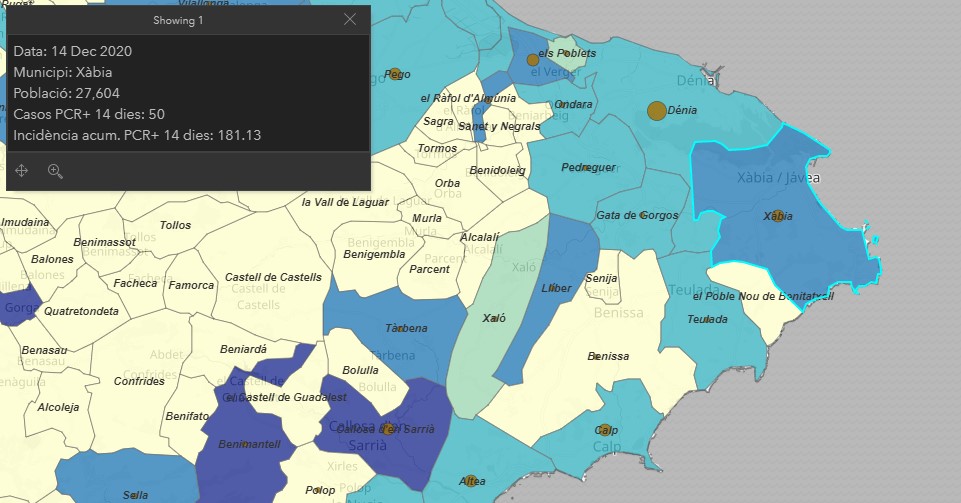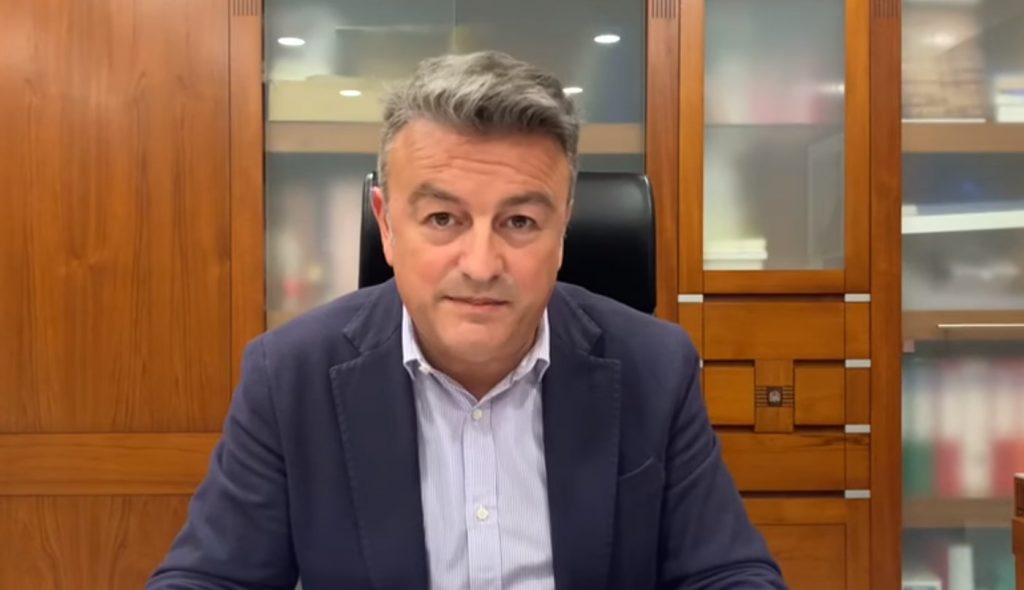Xàbia records 24 new infections over the weekend
The regional government has warned that unless the curve starts to flatten, extra measures are likely to be imposed over the Christmas period.

This is the latest information on the status of the health situation in Xàbia, the Marina Alta, the Comunidad Valenciana and across Spain.
For more information, please refer to the links given at the bottom of the page as our report is based on the official figures given in these sources.
Xàbia
Xàbia has recorded 24 new infections confirmed by PCR test since the last update with the total number of infections rising to 297 since the crisis began. The 14-day cumulative rate (IA) has risen, now standing at 181.13 new infections per 100,000 inhabitants. The death toll remains at 3.
CD Jávea confirmed that a senior squad member has tested positive for COVID-19; last weekend’s home game against Gandía CF was postponed after a opposition player also tested positive.
Mayor José Chulvi expressed his concern over the growing numbers for the municipality in a special announcement to the town last Friday, calling on citizens to take on more responsibility to stop the spread and make an extra effort to ensure that Christmas is one that can be enjoyed as well as we can, without extra measures to halt a rise in infections.

Marina Alta
The Dénia Health Authority, which covers the Marina Alta region, has recorded 64 new infections since the last update, bringing the total to 2,220 positive cases since the crisis began.
The 14-day IA rate has risen to 115.87 new infections per 100,000 inhabitants and it has been rising since the end of November.
The death toll in the Marina Alta remains at 38.
The 64 new infections have been recorded in the following municipalities:
- Xàbia – 24
- Dénia – 18
- Calp – 6
- El Vergel – 6
- Ondara – 3
- Pego – 3
- Gata de Gorgos – 2
- Adsubia – 1
- Beniarbeig – 1
Comunidad Valenciana
The data for the Comunidad Valenciana confirms that the region still has the highest COVID-19 positivity rate* in the country – 14.70% – which is almost double the national average. There are concerns that the continued failure to reduce this rate suggests that a third wave of infections should be anticipated in the region, with the regional government already considering even tighter restrictions over Christmas.
The 14-day IA rate for the region stands at 192.49 new infections per 100,000 inhabitants, just below the national figure. The rate has dropped by 23% in two weeks and is at its lowest since the end of October.
Regional president Ximo Puig has warned that the next few days will be “a very big test” for the Comunidad Valenciana as the data shows a rise in infections and deaths as the festive season approaches. The regional authorities are growing more concerned that continued violations of the necessary measures are hampering efforts to flatten the curve in the region and refuse to rule out tightening measures over Christmas if the situation requires it.
As nightlife venues were allowed to re-open with the necessary measures, the autonomous police inspected 158 premises over the last weekend and issued fines against 12 venues for failing to comply with any of the required COVID-19 measures or violating the terms of the Entertainment Law. Breaches discovered by the police included excess capacities beyond that allowed under the current regulations, customers not wearing face masks, a failure to ensure social distancing between tables, and the sharing of hookahs. The Generalitat Valenciana approved a resolution last week to allow nightlife venues such as discos and late-night pubs to re-open as cafeterias and food establishments, converting their dance floors into spaces for tables.
* The positivity rate refers to the percentage of all COVID-19 tests carried out which have come back positive. A high figure means that it doesn’t take many tests to come across a positive result.
Spain
The national 14-day IA rate stands at 193.65 new infections in 14 days per 100,000 inhabitants, up 2% on the previous update as Spain reports its first rise in weekend cases for five weeks, suggesting that the “downward trend” has come to an end.
Rafael Ortí Lucas, president of the Spanish Society of Preventative Medicine, Public Health and Hygiene, warned that “If we are having these small spikes now, I don’t know what will happen during Christmas” and suggests that the rise is most likely connected to shopping in late November and early December as measures were relaxed in some regions. The impact of the long holiday weekend is not likely to be reflected in the daily figures until later this week.
The rise in cases has been particularly bad in the Balearic Islands and the regional government has announced tougher measures to combat the spread, including a 10.00pm night-time curfew for the next two weeks, including Christmas Eve and New Year’s Eve. All visitors to the island, including domestic travellers, will need to provide proof of a negative PCR test taken within 72 hours of arrival if they travel from a region which has an IA rate above 150 per 100,000 inhabitants; at the moment, the only territories below that ceiling are the Canary Islands, Andalucia, Murcia and Ceuta.
The Canary Islands, which boasts the lowest IA rate in Spain, has also seen its rate rise substantially in the first half of December. Social and family gatherings are limited to six people, except for Tenerife, where it will be four. However, ten people may come together during the festive period.
Vaccines due to arrive in Spain on January 4th
A coronavirus vaccine will arrive in early January once the European Medicines Agency (EMA) approves a candidate, which is likely to be the Pfizer/BioNTech vaccine which is currently being administered in the UK. Health Minister Salvador Illa explained that Spain will be delivered 140 million doses, more than twice its population: “There will be vaccines for everyone, and there will be more than enough.” He added that if all goes well, 15 to 20 million Spaniards will be vaccinated by May or June, and a very significant number by the end of next summer.
Resource Links
COVID-19 C.Valenciana: Monitorage de la Situació
Ministero de Sanidad: Actualización nº 270 (14/12/2020)
El Pais



